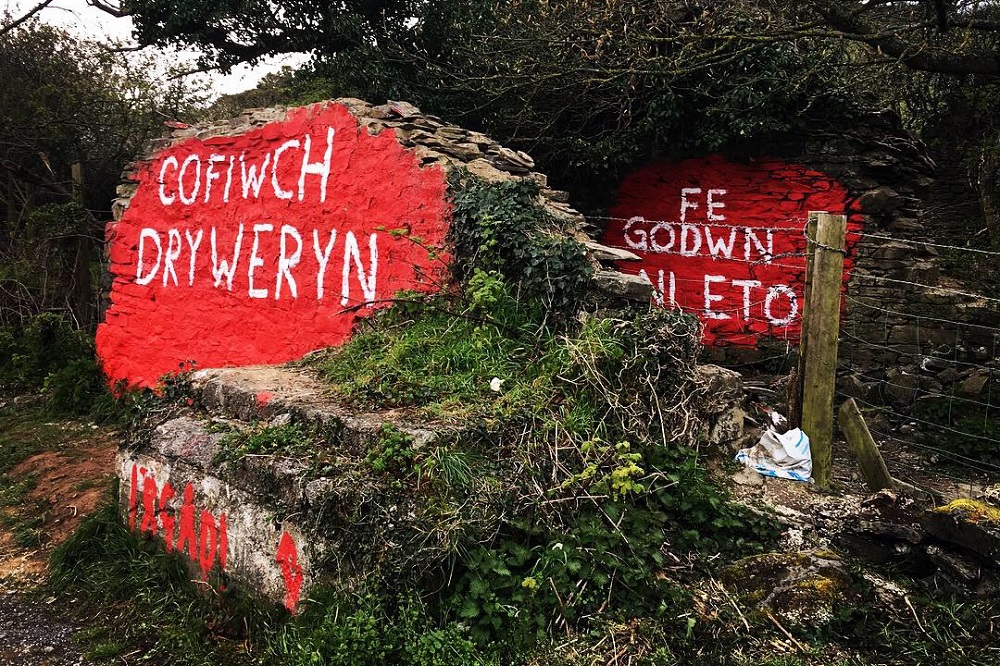A populist campaign for Welsh independence would repeat the damage of Brexit

Hefin David, Labour AM for Caerphilly
During the Easter holiday, I used Twitter to contribute to the burgeoning ‘Cofiwch Dryweryn’ debate. It was a swiftly composed tweet that was intended to convey my concern about the motivation behind the graffiti appearing on public land around Wales. It read:
“Can’t help thinking that graffitiing ‘Cofiwch Dryweryn’ on public land devalues the original monument and is about as cool as drawing Che Guevara on your wheelie bin.”
It was an ostensibly frivolous message to echo what I saw, and still see, as a frivolous campaign. I received a couple of hundred responses, many of which misunderstood the point I was intending to make.
Among other things, I was accused of being a Brit Nat, a traitor and a hater of the Welsh language. I am none of these things. I also received some strongly worded personal abuse which is the linga franca of twitter.
None of this is of any wider import but it is worth considering the broader argument behind my tweet.
The flooding Capel Celyn in the 1960’s caused deeply felt and justified anger. Thirty-five of thirty-six Welsh MPs opposed the decision.
The consequences led to the early beginnings of a stronger Welsh democracy, but at the time there was despair.
I recall the words of R S Thomas in his 1968 poem ‘Reservoirs’:
‘Where can I go then from the smell of decay, from the putrefying of a dead nation… of the tide elbowing our language into the grave we have dug for it.’
We should remember those feelings, of a community destroyed by the thoughtless actions of a distant and powerful state. But we should also recognise the progress we have made and consider whether Thomas’s words can really be applied to a modern Wales.
Populist
My argument about the current ‘Cofiwch Dryweryn’ campaign is that it does not encourage considered reflection. Instead, as Vaughan Roderick pointed out to me, the anger is fuelled by damage to a wall.
Graffitiing public land and selling mugs and t-shirts with ‘Cofiwch Dryweryn’ as a stylised slogan romanticises, commercialises and ultimately devalues the meaningful fury of the 60s campaign.
This is typical of the populism infecting our politics today. It is an approach that appeals to simple emotion in order to persuade people to support binary choices to resolve contemporary intractable problems.
This is an issue I have with the wider campaign for Welsh independence. I recall a tweet by Rhun ap Iorwerth, just after Geraint Thomas won the Tour de France. He said “…and to those miffed at hearing God Save the Queen ?? rather than Hen Wlad fy Nhadau on the Champs d’Elysee, it’s quite simple… it’s because we’re not an independent nation. We could be. Get on board!”
It is conceivable that the case for Welsh independence, like the leaving of the EU, could be won on the argument that, if we wrap ourselves more snugly in a flag, an uncertain world will appear less threatening.
A populist appeal of the heart could persuade a large section of the public in these turbulent times. A victory on that basis alone, however, would be an empty one.
Rational rather than emotional arguments are more likely to build sustainable support for independence and that may come from some unexpected quarters. Yet the evidence to support an economic case for independence at this time is thin on the ground.
Like most people, I’m still to be convinced that a Wales standing alone will result in our people quickly becoming better off, more secure and healthier. I am ambivalent as to whether this is because such a case can never be made or because it cannot be made right now, within existing economic structures.

Pragmatism
My preference is to tackle a very real and present problem, namely the grossly imbalanced state that constitutes the United Kingdom. It would take another article to explore the design of a renewed devolution settlement but suffice to say, the Senedd needs to have all the mechanisms of a modern parliament.
We need a fully federalised UK, true to the real meaning of the principle of subsidiarity – that problems are tackled at the most immediate level that is consistent with their resolution.
I fear that arguments for independence, and with that the contemporary ‘Cofiwch Dryweryn’ campaign, play to the heart but without offering a single meaningful improvement to people’s lives. It is indulgent and, probably unintentionally dishonest.
I am neither a British nor a Welsh nationalist, unconvinced by arguments for nationhood alone.
If the cause of Welsh independence is to progress without causing the same damage to our society as that caused by Brexit, it must make a convincing case based on rational pragmatism.
This case, if it exists, has not yet been advanced.
We can’t run Nation.Cymru without your help! If you support the development of an independent Welsh media for the people of Wales, please donate now!
Support our Nation today
For the price of a cup of coffee a month you can help us create an independent, not-for-profit, national news service for the people of Wales, by the people of Wales.





